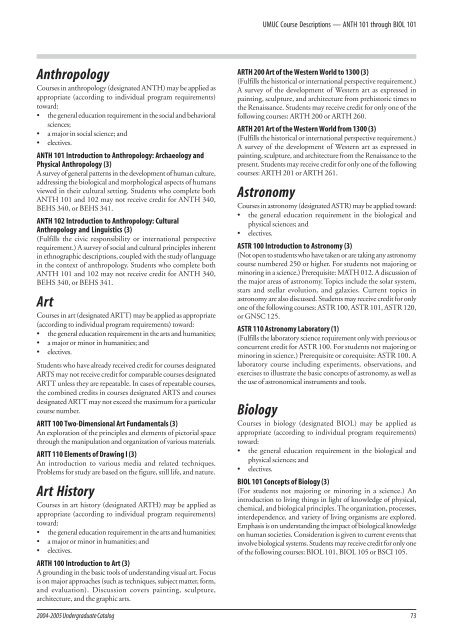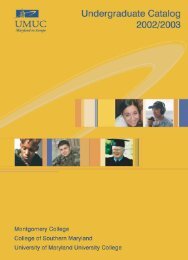Statements of Policy - UMUC Europe
Statements of Policy - UMUC Europe
Statements of Policy - UMUC Europe
You also want an ePaper? Increase the reach of your titles
YUMPU automatically turns print PDFs into web optimized ePapers that Google loves.
Anthropology<br />
Courses in anthropology (designated ANTH) may be applied as<br />
appropriate (according to individual program requirements)<br />
toward:<br />
• the general education requirement in the social and behavioral<br />
sciences;<br />
• a major in social science; and<br />
• electives.<br />
ANTH 101 Introduction to Anthropology: Archaeology and<br />
Physical Anthropology (3)<br />
A survey <strong>of</strong> general patterns in the development <strong>of</strong> human culture,<br />
addressing the biological and morphological aspects <strong>of</strong> humans<br />
viewed in their cultural setting. Students who complete both<br />
ANTH 101 and 102 may not receive credit for ANTH 340,<br />
BEHS 340, or BEHS 341.<br />
ANTH 102 Introduction to Anthropology: Cultural<br />
Anthropology and Linguistics (3)<br />
(Fulfills the civic responsibility or international perspective<br />
requirement.) A survey <strong>of</strong> social and cultural principles inherent<br />
in ethnographic descriptions, coupled with the study <strong>of</strong> language<br />
in the context <strong>of</strong> anthropology. Students who complete both<br />
ANTH 101 and 102 may not receive credit for ANTH 340,<br />
BEHS 340, or BEHS 341.<br />
Art<br />
Courses in art (designated ARTT) may be applied as appropriate<br />
(according to individual program requirements) toward:<br />
• the general education requirement in the arts and humanities;<br />
• a major or minor in humanities; and<br />
• electives.<br />
Students who have already received credit for courses designated<br />
ARTS may not receive credit for comparable courses designated<br />
ARTT unless they are repeatable. In cases <strong>of</strong> repeatable courses,<br />
the combined credits in courses designated ARTS and courses<br />
designated ARTT may not exceed the maximum for a particular<br />
course number.<br />
ARTT 100 Two-Dimensional Art Fundamentals (3)<br />
An exploration <strong>of</strong> the principles and elements <strong>of</strong> pictorial space<br />
through the manipulation and organization <strong>of</strong> various materials.<br />
ARTT 110 Elements <strong>of</strong> Drawing I (3)<br />
An introduction to various media and related techniques.<br />
Problems for study are based on the figure, still life, and nature.<br />
Art History<br />
Courses in art history (designated ARTH) may be applied as<br />
appropriate (according to individual program requirements)<br />
toward:<br />
• the general education requirement in the arts and humanities;<br />
• a major or minor in humanities; and<br />
• electives.<br />
ARTH 100 Introduction to Art (3)<br />
A grounding in the basic tools <strong>of</strong> understanding visual art. Focus<br />
is on major approaches (such as techniques, subject matter, form,<br />
and evaluation). Discussion covers painting, sculpture,<br />
architecture, and the graphic arts.<br />
<strong>UMUC</strong> Course Descriptions — ANTH 101 through BIOL 101<br />
ARTH 200 Art <strong>of</strong> the Western World to 1300 (3)<br />
(Fulfills the historical or international perspective requirement.)<br />
A survey <strong>of</strong> the development <strong>of</strong> Western art as expressed in<br />
painting, sculpture, and architecture from prehistoric times to<br />
the Renaissance. Students may receive credit for only one <strong>of</strong> the<br />
following courses: ARTH 200 or ARTH 260.<br />
ARTH 201 Art <strong>of</strong> the Western World from 1300 (3)<br />
(Fulfills the historical or international perspective requirement.)<br />
A survey <strong>of</strong> the development <strong>of</strong> Western art as expressed in<br />
painting, sculpture, and architecture from the Renaissance to the<br />
present. Students may receive credit for only one <strong>of</strong> the following<br />
courses: ARTH 201 or ARTH 261.<br />
Astronomy<br />
Courses in astronomy (designated ASTR) may be applied toward:<br />
• the general education requirement in the biological and<br />
physical sciences; and<br />
• electives.<br />
ASTR 100 Introduction to Astronomy (3)<br />
(Not open to students who have taken or are taking any astronomy<br />
course numbered 250 or higher. For students not majoring or<br />
minoring in a science.) Prerequisite: MATH 012. A discussion <strong>of</strong><br />
the major areas <strong>of</strong> astronomy. Topics include the solar system,<br />
stars and stellar evolution, and galaxies. Current topics in<br />
astronomy are also discussed. Students may receive credit for only<br />
one <strong>of</strong> the following courses: ASTR 100, ASTR 101, ASTR 120,<br />
or GNSC 125.<br />
ASTR 110 Astronomy Laboratory (1)<br />
(Fulfills the laboratory science requirement only with previous or<br />
concurrent credit for ASTR 100. For students not majoring or<br />
minoring in science.) Prerequisite or corequisite: ASTR 100. A<br />
laboratory course including experiments, observations, and<br />
exercises to illustrate the basic concepts <strong>of</strong> astronomy, as well as<br />
the use <strong>of</strong> astronomical instruments and tools.<br />
Biology<br />
Courses in biology (designated BIOL) may be applied as<br />
appropriate (according to individual program requirements)<br />
toward:<br />
• the general education requirement in the biological and<br />
physical sciences; and<br />
• electives.<br />
BIOL 101 Concepts <strong>of</strong> Biology (3)<br />
(For students not majoring or minoring in a science.) An<br />
introduction to living things in light <strong>of</strong> knowledge <strong>of</strong> physical,<br />
chemical, and biological principles. The organization, processes,<br />
interdependence, and variety <strong>of</strong> living organisms are explored.<br />
Emphasis is on understanding the impact <strong>of</strong> biological knowledge<br />
on human societies. Consideration is given to current events that<br />
involve biological systems. Students may receive credit for only one<br />
<strong>of</strong> the following courses: BIOL 101, BIOL 105 or BSCI 105.<br />
2004-2005 Undergraduate Catalog 73






